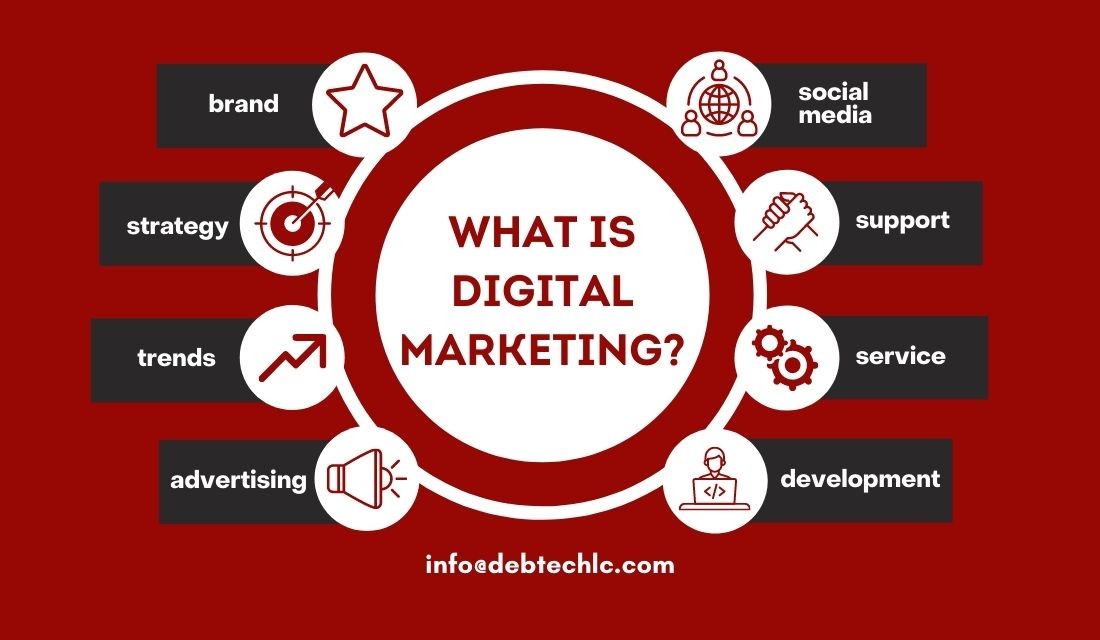What is Digital Marketing?
As more and more consumers are living and breathing online, it is becoming more and more important for businesses to establish a storng digital presense and focus more on their online marketing and oppose to traditional eay of marketing. But there is a lot of confusion regarding online marketing, What is digital or online marketing? What to do about it? Is SEO is online marketing? How about paid ad? How to use social media for growing my business?
Well lets try to answer that. Degital marketing is not one thing, it is like your traditional marketing has many layers and all of themhas their own benifits but you might not need to do all for your business. It should be crafted according to your business need. Lets try to answer some of the question you might have in your mind about digital marketing..
What Is Digital Marketing?
From a general standpoint, marketing is the practice of identifying and satisfying customer needs. This is a particularly important task in the business context, as successful marketing efforts can drive inbound leads and attract a large customer case. The traditional marketing cycle involves an analysis of market orientation, product mix and business environment. Even though marketing has deep roots in business history and culture, digital marketing is a relatively new practice.
What are the Digital Marketing Channels?
There are seven main digital marketing channels you can use to drive traffic, engage prospects and convert.
-
Search Engine Optimization (SEO): SEO stands for search engine optimization, which is a set of practices designed to improve the appearance and positioning of web pages in organic search results.
-
Pay-Per-Click advertising (PPC): PPC or pay-per-click is a type of internet marketing which involves advertisers paying a fee each time one of their ads is clicked. Simply, you only pay for advertising if your ad is actually clicked on.
-
Social Media Marketing: Social media marketing is the use of social media platforms and websites to promote a product or service.
-
Content Marketing: Content marketing is a marketing strategy used to attract, engage, and retain an audience by creating and sharing relevant articles, videos, podcasts, and other media.
-
Email Marketing: Email marketing is the act of sending a commercial message, typically to a group of people, using email.
-
Mobile Marketing: Mobile marketing is any advertising activity that promotes products and services via mobile devices, such as tablets and smartphones.
-
Affiliate Marketing: Affiliate marketing is a type of performance-based marketing in which a business rewards one or more affiliates for each visitor or customer brought by the affiliate's own marketing efforts.
Be aware, while these are the most common digital marketing channels, the evolving digital landscape means that there could be more than these. Let’s dive in and find out more about each one.
What Benefits Can I Achieve Through Digital Marketing?
More specifically, digital marketing can help businesses achieve any or all of the following benefits:
-
Global Reach — Unlike traditional methods, digital marketing is not necessarily bound to a specific geographic area. The internet is available to customers across the globe. This allows businesses to market and sell to customers who live in a different state or country, removing many traditional barriers to entry.
-
Low Cost of Entry — To achieve the global reach of digital marketing through traditional channels, there would be a serious price tag attached. On the other hand, certain aspects of digital marketing can be achieved with a small investment of time and resources. For example, even small or startup businesses can create a website, manage social media and publish blogs without breaking the bank.
-
Measurable ROI — In order to maximise profits, businesses must carefully evaluate return on investment (ROI). With traditional marketing, ROI can be difficult, sometimes impossible, to measure. On the other hand, digital marketing provides real-time visibility into the effectiveness of each campaign, enabling business leaders to make well-informed decisions to drive revenue and increase profit.
-
Improved Targeting — Digital marketing allows businesses to target very specific demographics of potential customers. By engaging customers in a particular geography, industry or social channel, businesses have a much better chance of reaching their target demographic.
-
Dynamic Adaptability — Digital marketing strategies are extremely malleable and flexible, enabling businesses to adjust course when needed. Unlike long-term, traditional marketing campaigns, businesses can adjust their digital efforts on the fly, enabling quick pivots when necessary to realise commercial opportunity.
Overall, businesses of every shape and size can achieve powerful benefits through effective use of digital marketing methods. Furthermore, the cost of digital marketing can be tailored to each specific business, stripping many barriers to entry of traditional methods. With so many benefits available for just about any budget, it makes sense why so many businesses are succeeding with digital marketing efforts. Looking for evaluate your digital marketing effort? We can definetly help you in that. For free evaluation click here.
